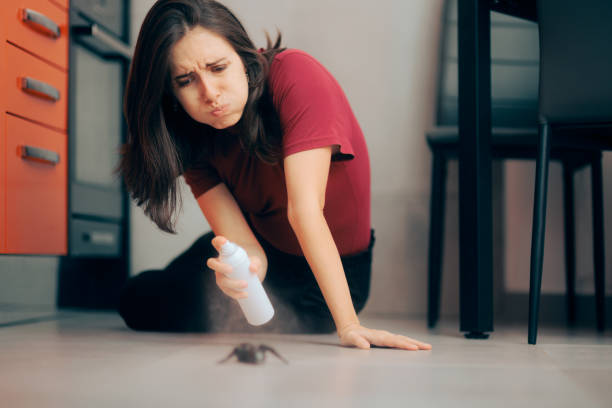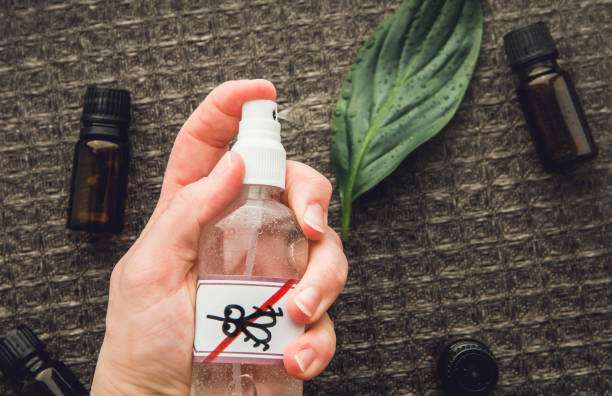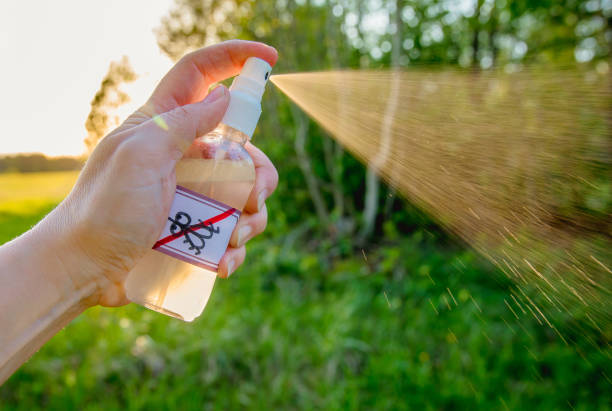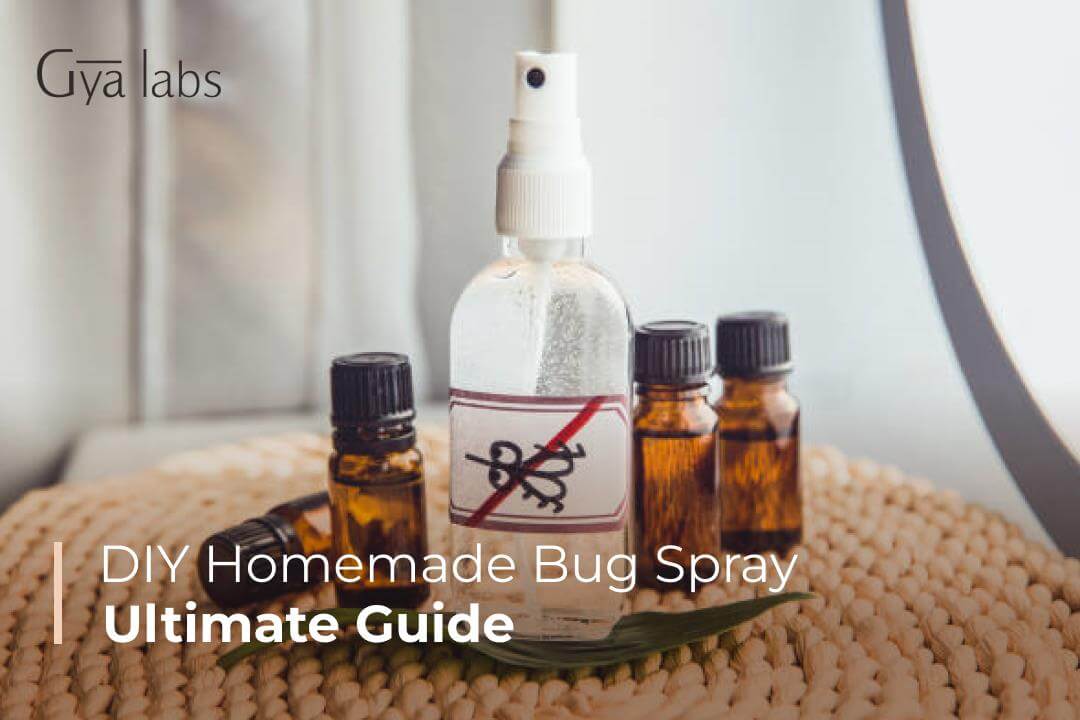Are you tired of pesky bugs and mosquitoes ruining your outdoor experience? Look no further as we explore natural bug-repellent recipes using essential oils and effective repellent blends to keep those insects at bay.
In this ultimate guide, we will cover everything you need to know about making your very own bug spray. From essential oils like lavender, eucalyptus, and citronella, to the perfect spray bottle and homemade bug spray recipes, we have you covered. Say goodbye to bug bites and hello to enjoying the great outdoors!

Don’t let bug bites ruin your outdoor adventures. Join us as we unlock the secrets to effective bug repellents made with essential oils, provide insights on natural insect repellent sprays, and equip you with the knowledge to protect yourself and your loved ones. It’s time to take control and make your own natural bug repellent with essential oils. Let’s dive in!
Why Homemade Bug Spray?
When it comes to keeping bugs at bay, homemade natural bug spray offers several advantages over commercial options. Here’s why you should consider making your own bug spray:
1. Natural Ingredients
Homemade bug sprays allow you to control the ingredients, ensuring you’re using natural and non-toxic substances (1). Commercial bug sprays often contain synthetic chemicals that may have adverse effects on your health and the environment. By using homemade bug spray, you can avoid these potentially harmful ingredients.
2. Customizable Formulas
Making your own bug spray gives you the freedom to create personalized formulas. You can choose from a wide range of essential oils, such as citronella, lavender, lemon eucalyptus essential oil, or peppermint, based on their bug-repelling properties and the scents you prefer. This customization ensures that your bug spray suits your specific needs and preferences.

3. Cost-Effective Solution
Homemade bug sprays are generally more budget-friendly than commercial options. The ingredients needed to make bug spray at home, such as essential oils and carrier liquids like witch hazel or distilled water, are often more affordable in the long run compared to purchasing pre-made products. By making your own bug spray, you can save money without compromising on effectiveness.
4. Environmentally Friendly
Commercial bug sprays often contain chemicals that can be harmful to the environment, including aquatic life and beneficial insects like bees and butterflies. Homemade bug sprays, on the other hand, can be made using eco-friendly ingredients. By opting for homemade bug spray, you contribute to a more sustainable and eco-conscious approach to pest control.
5. Personal Satisfaction
There’s a sense of satisfaction and empowerment that comes with making your own bug spray. You have full control over the process, from choosing the ingredients to crafting the final product. By taking a DIY approach, you become more self-reliant and gain a deeper understanding of the natural remedies available to you.
Remember, homemade bug sprays may have shorter shelf lives compared to commercial products. It’s important to store them properly and make fresh batches as needed. Additionally, while homemade bug sprays can be effective, they may not offer the same longevity or potency as some commercial options. Regular reapplication may be necessary for optimal bug protection.
Why Use Essential Oils?
Lots of essential oils offer a natural alternative to many sprays in the market, and there are many reasons to consider them as a key treatment for mosquito bites (2). Here are some reasons why essential oils are beneficial:
1. Natural Bug Repellent Properties
Many essential oils possess inherent bug-repelling properties. Certain scents and compounds in essential oils act as natural deterrents for insects, including mosquitoes, flies, and ticks. By incorporating essential oils into your bug spray, you harness the power of nature to ward off pests and make your own homemade natural bug repellents work.
2. Safe and Non-Toxic
Essential oils work wonders because they are derived from plants and are generally considered safe when used properly. Unlike normal bug sprays that often contain synthetic chemicals, homemade essential oil bug sprays offer a natural and non-toxic alternative. This is particularly important if you have concerns about exposing yourself, your family, or the environment to potentially harmful substances.
3. Versatility and Customization
Essential oils also provide a wide range of scents and properties, allowing you to customize your bug spray according to your preferences and specific needs. Whether you prefer the calming aroma of lavender, the refreshing scent of eucalyptus, or the citrusy notes of citronella, there are essential oils to suit every preference.
4. Additional Benefits
Beyond their bug-repelling properties, essential oils offer additional benefits. Many essential oils have soothing and calming effects, which can help alleviate the discomfort caused by bug bites. Lavender, for example, is known for its calming properties, while tea tree oil has antibacterial and antiseptic qualities.
5. Sustainable and Environmentally Friendly
Using essential oils aligns with a more sustainable and eco-conscious approach to pest control. As plant-based extracts, essential oils are renewable resources that can be harvested without causing harm to the environment. By choosing essential oils over synthetic chemicals, you reduce your ecological footprint and contribute to a healthier planet.

6. Aromatherapy Benefits
Essential oils are widely used in aromatherapy for their therapeutic properties. When you incorporate essential oils into your bug spray, you not only repel bugs but also enjoy the potential mood-enhancing and relaxation benefits that these natural scents can provide.
Remember to use essential oils safely and responsibly. Essential oils are highly concentrated, and some oils can cause skin reactions or irritations if not properly diluted. Always follow recommended dilution guidelines and conduct a patch test before using essential oils on your skin.
Must read benefits of panaway essential oil
What Essential Oils Do Mosquitoes Hate?
Mosquitoes are notorious for ruining outdoor activities, but many essential oils can help keep them at bay. Here are some essential oils that mosquitoes dislike:
- Citronella: Known for its strong scent, citronella essential oil is a popular choice for repelling mosquitoes. It masks the scents that attract mosquitoes and disrupts their ability to locate their targets.
- Lavender oil: Lavender essential oil is also great as it not only has a pleasant aroma but also acts as a natural mosquito repellent. Its soothing scent is known to repel mosquitoes effectively.
- Eucalyptus oil: Eucalyptus essential oil contains compounds that mosquitoes find offensive. Its strong scent helps keep these pesky insects away.
- Peppermint oil: Peppermint essential oil has a refreshing scent that mosquitoes dislike. Its strong aroma acts as a deterrent, making it an excellent choice for a bug-repellent blend.
How to Make Homemade Bug Spray Repellent
Creating your own homemade bug repellent with essential oils or insect repellent is easier than you might think. Here’s a simple essential oil bug spray recipe to get you started:
Ingredients:
- 4 ounces of distilled water
- 2 ounces of witch hazel or rubbing alcohol
- 30-40 drops of essential oils (choose from citronella, lavender, eucalyptus, peppermint, or a combination)
Instructions:
- Mix the distilled water and witch hazel (or rubbing alcohol) in a spray bottle. This combination helps disperse the essential oils evenly.
- Add 30-40 drops of your chosen essential oils to the mixture. You can adjust the amount based on your preference and the strength of the scent.
- Secure the spray bottle cap and shake well to ensure all the ingredients are thoroughly mixed.
- Your homemade bug spray repellent is now ready to use. Simply spray it on your skin, clothing, or outdoor areas where bugs are a problem.
Remember to shake the bottle before each use to distribute the essential oils evenly. Apply the bug spray liberally and reapply as needed, especially after swimming or sweating.
DIY Homemade Bug Spray Mosquito Repellent (Essential Oils)
Here are 5 DIY natural insect/bug spray recipes using essential oils blends:
Recipe #1 – Refreshing Citrus Bug Spray
Ingredients
- 10 drops of citronella essential oil
- 10 drops of lemongrass essential oil
- 5 drops of peppermint essential oil
Recipe #2 – Soothing Lavender Bug Spray
Ingredients
- 15 drops of lavender essential oil
- 10 drops of tea tree essential oil
- 5 drops of cedarwood essential oil
Recipe #3 – Fresh Herbal Bug Spray
Ingredients
- 10 drops of rosemary essential oil
- 10 drops of thyme essential oil
- 5 drops of basil essential oil
Recipe #4 – Woody and Earthy Bug Spray
Ingredients
- 15 drops of cedarwood essential oil
- 10 drops of vetiver essential oil
- 5 drops of patchouli essential oil
Recipe #5 – Floral Delight Bug Spray
Ingredients
- 10 drops of geranium essential oil
- 10 drops of ylang-ylang essential oil
- 5 drops of lavender essential oil
Instructions
To make your own DIY bug sprays/ repellents that smells fantastic:
- Fill a 4 oz spray bottle halfway with witch hazel.
- Add the respective essential oils for the chosen recipe.
- Fill the remaining space in the bottle with distilled water.
- Shake well before each use.
- Apply the bug spray to exposed skin and clothing.
Remember to customize the quantities of essential oils according to your preferences, and shake the glass spray bottle well before each use. Enjoy the benefits of natural bug repellents with these DIY bug spray essential oil recipes!
How to Use Essential Oils Safely & Effectively
Using essential oils to make all-natural bug sprays safely and effectively is essential to ensure both efficacy and the well-being of yourself and others. Here are some guidelines to follow:
- Dilute Essential Oils: Even though effective mosquito repellents made from essential oils are easy and inexpensive to make, finding the right essential oils can be hard. Many essential oils are highly concentrated and potent, so it’s crucial to dilute them before application. Mix essential oils with carrier oils such as almond oil, coconut oil, or jojoba oil to create a safe and effective bug-repellent blend.
- Perform Patch Test: Before using any essential oil bug repellent on your skin, conduct a patch test. Apply a small amount of the diluted blend to a small area of skin and wait for 24 hours to check for any adverse reactions.
- Avoid Sensitive Areas: Keep essential oil mosquito sprays away from sensitive areas such as eyes, mouth, and open wounds. These oils may cause irritation or discomfort when applied to these areas.
- Reapply as Needed: Essential oil bug repellents may require more frequent application compared to synthetic chemical repellents. Reapply the spray every few hours or as needed, especially if you’ve been sweating or swimming.
- Use in Well-Ventilated Areas: When applying essential oil bug sprays, make sure you are in a well-ventilated area to avoid inhaling excessive amounts of the oils.
- Safe Usage for Children and Pets: Certain essential oils may not be safe for use on young children or pets. Always research and ensure the oils used are safe for the intended recipients. Consult with a healthcare professional or veterinarian if needed.
- Store Properly: Essential oils should be stored in dark, glass bottles in a cool and dry place. Keep them out of reach of children and pets.
- Be Mindful of Allergies: Keep in mind that essential oils are safe only if used properly. Some individuals may have allergies or sensitivities to certain essential oils. If you or anyone in your household has known allergies, carefully research and select essential oils that are safe for everyone.
Remember, essential oils are natural substances, but they still require proper handling and caution. By following these guidelines, you can safely and effectively use essential oils as bug repellents to protect yourself and your loved ones from pesky bugs.
Conclusion
In conclusion, using essential oils in bug sprays are an easy solution that also provide the best insect repellent recipes. is a fantastic natural alternative to chemical-laden commercial products. By creating your own DIY bug spray with essential oils like citronella, lavender, or peppermint, you can effectively keep bugs at bay while enjoying the benefits of pleasant scents. Remember to dilute the oils, perform patch tests, and apply as needed. With homemade bug sprays, you can confidently embrace the outdoors and bid farewell to those pesky bug bites. Happy bug-repelling!
Frequently Asked Questions
How do you make bug spray with essential oils?
To make bug spray with essential oils, you can combine your preferred essential oils with a carrier oil such as almond oil or coconut oil. Dilute the essential oils and carrier oil in a spray bottle, and shake well before each use.
What essential oils to spray for bugs?
Effective essential oils to spray for bugs include citronella, lavender, lemongrass, peppermint, eucalyptus, tea tree, and cedarwood. These oils have natural repellent properties that can help keep bugs away.
How do you make homemade bug spray?
To make homemade bug spray, mix essential oils with a carrier oil like witch hazel or vinegar, and add distilled water to dilute the mixture. Transfer the blend to a spray bottle, shake well, and apply to exposed skin or clothing.
How much essential oil do I put in bug spray?
The amount of essential oil to use in bug spray can vary depending on personal preference and the strength of the oil. As a general guideline, you can start with 10-20 drops of essential oil per ounce of carrier oil or water. Adjust the concentration based on effectiveness and desired scent.
How long does essential oil bug spray last?
The longevity of essential oil bug spray can vary depending on the specific oils used and environmental factors. In general, the scent and effectiveness of the spray can last for a few hours. It is recommended to reapply the bug spray every few hours or as needed for optimal protection
Source:
- Lots of essential oils offer a natural alternative to many sprays in the market, and there are many reasons to consider them as a key treatment for mosquito bites. https://books.google.co.in/books?hl=en&lr=&id=l2DLBQAAQBAJ&oi=fnd&pg=PA275&dq=Lots+of+essential+oils+offer+a+natural+alternative+to+many+sprays+in+the+market,+and+there+are+many+reasons+to+consider+them+as+a+key+treatment+for+mosquito+bites.+&ots=FDX9hGiPlc&sig=mUh9750b_bOQ1BPhf-H-vBUPLX0&redir_esc=y#v=onepage&q&f=false
- An approach to natural insect repellent formulations: from basic research to technological development https://www.sciencedirect.com/science/article/abs/pii/S0001706X19311970
